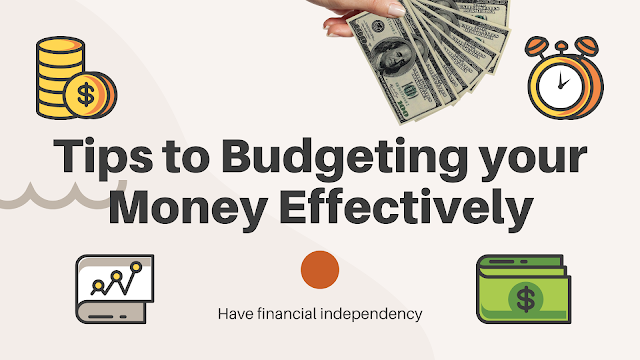Budgeting your money effectively is an important step in achieving financial stability and reaching your financial goals. Whether you're saving for a down payment on a house, paying off debt, or simply trying to make ends meet, creating and sticking to a budget can help you make the most of your income and avoid overspending. Here are best tips to budgeting your money.
5 Tips to budgeting your money effectively:
1. Know your income and expenses: The first step in budgeting is understanding how much money you have coming in and how much you're spending. Make a list of your regular income sources, including salary, bonuses, and any other forms of income. Then, make a list of your regular expenses, including bills, rent or mortgage payments, groceries, and other necessary expenses. Be sure to include any irregular expenses that you incur on a less frequent basis, such as car repairs or insurance premiums.
2. Set financial goals: Having clear financial goals can help you stay motivated and focused as you budget. Whether you're saving for a specific purchase, paying off debt, or simply trying to build up your savings, having a goal in mind can help you make decisions about your spending and allocate your money in a way that aligns with your priorities.
3. Create a budget: Once you have a good understanding of your income and expenses, it's time to create a budget. There are many different approaches to budgeting, but one simple method is to use the 50/30/20 rule. Under this rule, you allocate 50% of your income to necessities like housing, food, and utilities, 30% to discretionary spending like entertainment and dining out, and 20% to savings and debt repayment. Of course, your specific budget will depend on your individual circumstances and financial goals.
4. Track your spending: To make the most of your budget, it's important to keep track of your spending. This can help you identify areas where you may be overspending and make adjustments as needed. There are many tools available to help you track your spending, including apps, software programs, and spreadsheet templates. You can also simply keep a record of your spending by writing down all of your purchases in a notebook or on a piece of paper.
5. Look for ways to save: Once you have a budget in place, look for ways to save money. This could involve finding ways to reduce your expenses, such as by shopping around for better rates on bills or cutting back on non-essential spending. You may also be able to increase your income by taking on additional work or negotiating a raise at your current job.
Budgeting your money effectively takes time and discipline, but it can be a powerful tool for achieving your financial goals. By following these five tips, you can take control of your finances and make the most of your income. Best of luck, and thank you for reading. WhatHowAns

Comments
Post a Comment